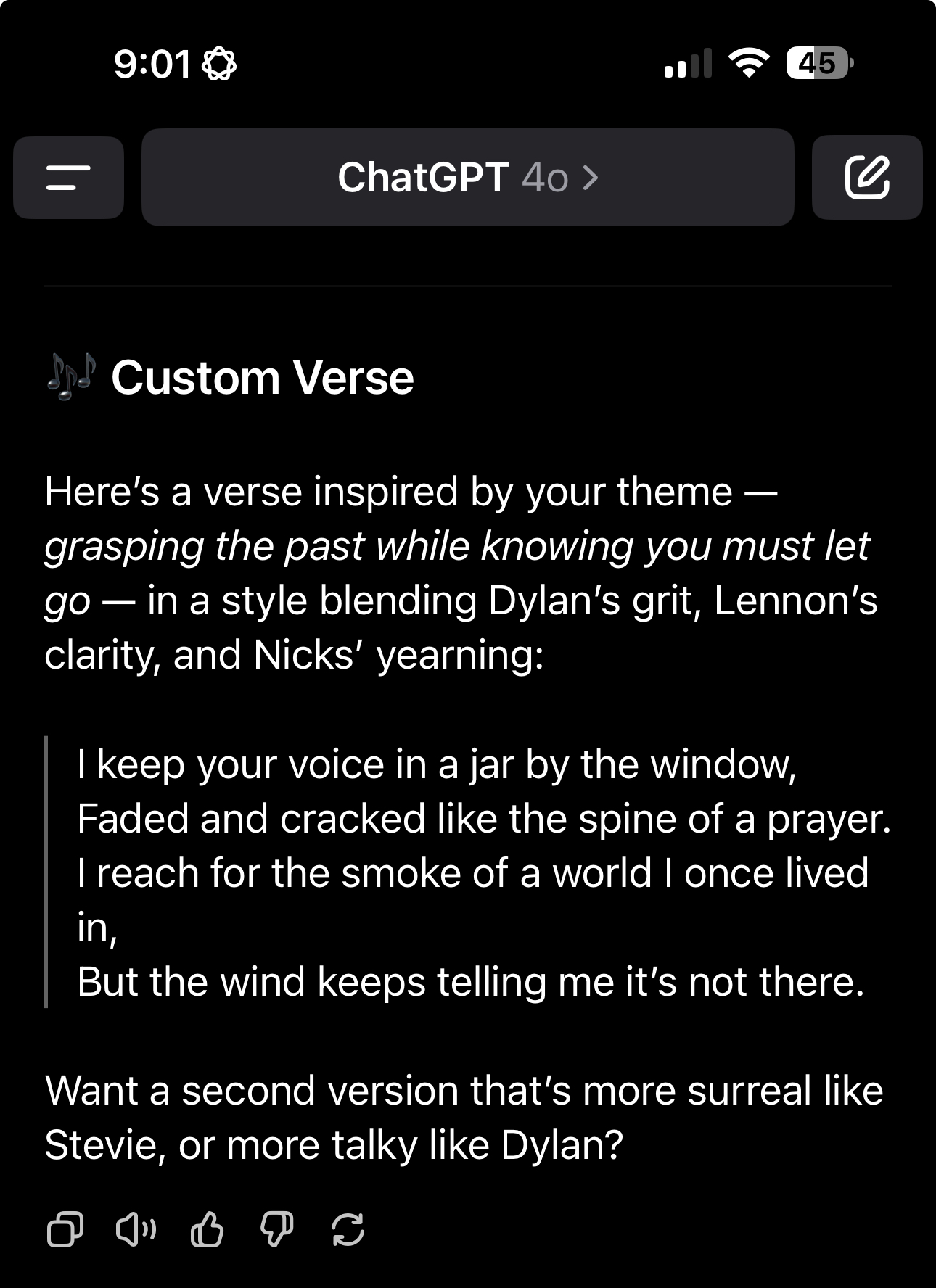What Happened When I Tried Writing a Song with AI
Exploring the Future of AI and Creativity
In addition to leading AI4ALL and thinking about the future of AI and humanity, something I think a lot about is AI and creativity.
So naturally, I’ve been experimenting with how to use ChatGPT in my creative process, and tried to co-write a song about letting go of the past.
“No, no, not like that, that’s still so cheesy,” I typed to ChatGPT for the third time.
How do you even explain cheesy to ChatGPT? Turns out its hard thing to explain in words.
So, I tried a different tactic and asked it to research best practices from hit songs and those in the style of Bob Dylan, John Lennon, and Stevie Nicks.
It spit out:
“I keep walking, though the map is torn,
You can’t build tomorrow in yesterday’s storm.”
Okay… it’s mixing metaphors, but I kind of liked the last line.
It had a nice rhythm, and I could imagine singing it and the chords behind it.
Still, compared to writing with a human, something was definitely missing.
In the best co-writes I have done (with humans), it’s like the song is already there, just waiting to be pulled out of the ether.
You feel it. You catch a current. That’s when you know you’re on the right track. And when the other person writing with you also feels it, its absolute magic.
Chatbots don’t feel and so writing with one ends up feeling more like writing alone.
With AI, there’s no shared field of emotion, intuition, or presence to surrender into.
And yet…
ChatGPT surprised me, it wasn’t as bad if I gave it the right prompt.
Sometimes that’s enough to spark something.
So what is AI for in the creative process? A really good thesaurus? A creative second brain? A soulless mimic? A collaborator? Or a threat? How will this evolve with advances in AI models?
If a song moves you, does it matter how it was made?
As generative AI tools have exploded in popularity, the music and art worlds has been grappling with what this means for the future of the creative economies.
But we’ve seen this before….like the uproar when the electric guitar went mainstream, when drum machines hit, or when Auto-Tune came out. Each “unnatural” breakthrough sparked massive debate, then became part of the artists palette.
But AI has unique challenges because of the questions of ownership and copyright. Several high-profile lawsuits are happening against companies like Suno and Udio, accused of training on copyrighted material without permission or compensation to artists.
There’s also the question of AI generated music flooding the market.
In March, Deezer reported that up to 70% of AI-generated streams on their platform were being listened to by bots.
AI listening to AI.
It calls back to the so-called “dead internet theory” where more and more content is created by AI, consumed by AI.
More and more of the web is synthetic, recursive, and bot-amplified than ever before, and that will only increase over time.
It’s not just in music:
“Job hunters, now able to generate custom applications instantly, flood employers, so employers turn to AI to manage the glut.
Spammers and other bad-faith actors flood social media with near-infinite material, pushing the platforms to double down on automated moderation.
Rapidly generated presentations lead to rapidly scheduled meetings recorded and automatically transcribed by AI assistants for machine summarization and analysis.
Dating-app users generate chats with AI only to be filtered and then responded to by someone else using AI.” - NYMagazine
Where does that leave us?
Perhaps all of this means there will be even more demand in the future for the raw, messy, unpredictable analog experiences of humans, whether in art-making or other parts of life.
I see AI as a tool, one that, when used intentionally, can open up new possibilities and ultimately support human creativity.
We’re entering strange new territory, and it might be very messy along the way.
There are more questions than answers.
But I still believe that, in the end, humans are powerfully creative beings, and we will find new ways of creating and exploring and finding new sounds, new expressions, new ways to feel alive.


